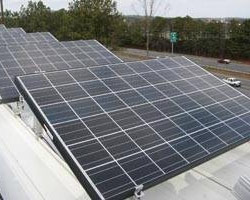
The Oregon Public Utilities Commission approved new rules on Friday (June, 4) that will establish a four-year pilot program to trial a solar feed-in tariff. New incentives are offered for solar systems installed after July 1, 2010.
Commission Chairman Ray Baum, Oregon PUC said: “We are trying to strike a balance between providing an incentive while keeping an eye on controlling utility costs”.
From the beginning the system will not rely on state tax credits. The utilities paying residents will be involved with a guaranteed amount for their power over a 15 year period. Rates will be set at a fixed rate for small-scale and medium –scale solar installations. For large-scale plants will be carried out a competitive bidding process.
Commission Chairman Ray Baum said: “While Oregon may not be the first state that comes to mind when you think about solar, I believe this state has a lot of potential and these pilot projects will show us if we can encourage the use of this renewable resource in a cost effective way.”
The customers of Portland General Electric (PGE), PacificCorp and Idaho Power utilities that combined serve three-quarters of Oregon’s electric users will have the access at this pilot project which will be limited to a total 25 megawatts (2,500kw) enough electricity for around 2,500 homes. The incentive payments total amount for a small-scale solar system (less then 10 kilowatt output) has been set between 55 – 65 cents per kilowatt-hour (kWh) of power produced. In that four regions of Oregon the amount of incentive will be different, so that areas that would otherwise see slightly longer payback times for solar equipment would have slightly higher incentives. The medium-scale solar installations of 10kW up to 100kW will have a 55-cent per kWh rate the same across the whole state.
The rates will be reviewed every six months of the four –year scheme by the Public Utilities Commission in order to decide whether it needs adjusting.
“We are trying to strike a balance between providing an incentive for solar development while at the same time keeping an eye on controlling utility costs. If the initial rate is set too low, customers may be reluctant to sign up” said Commission Chairman Baumm. Solar systems larger than above 500kW will not be subject to the feed-in tariff scheme.



